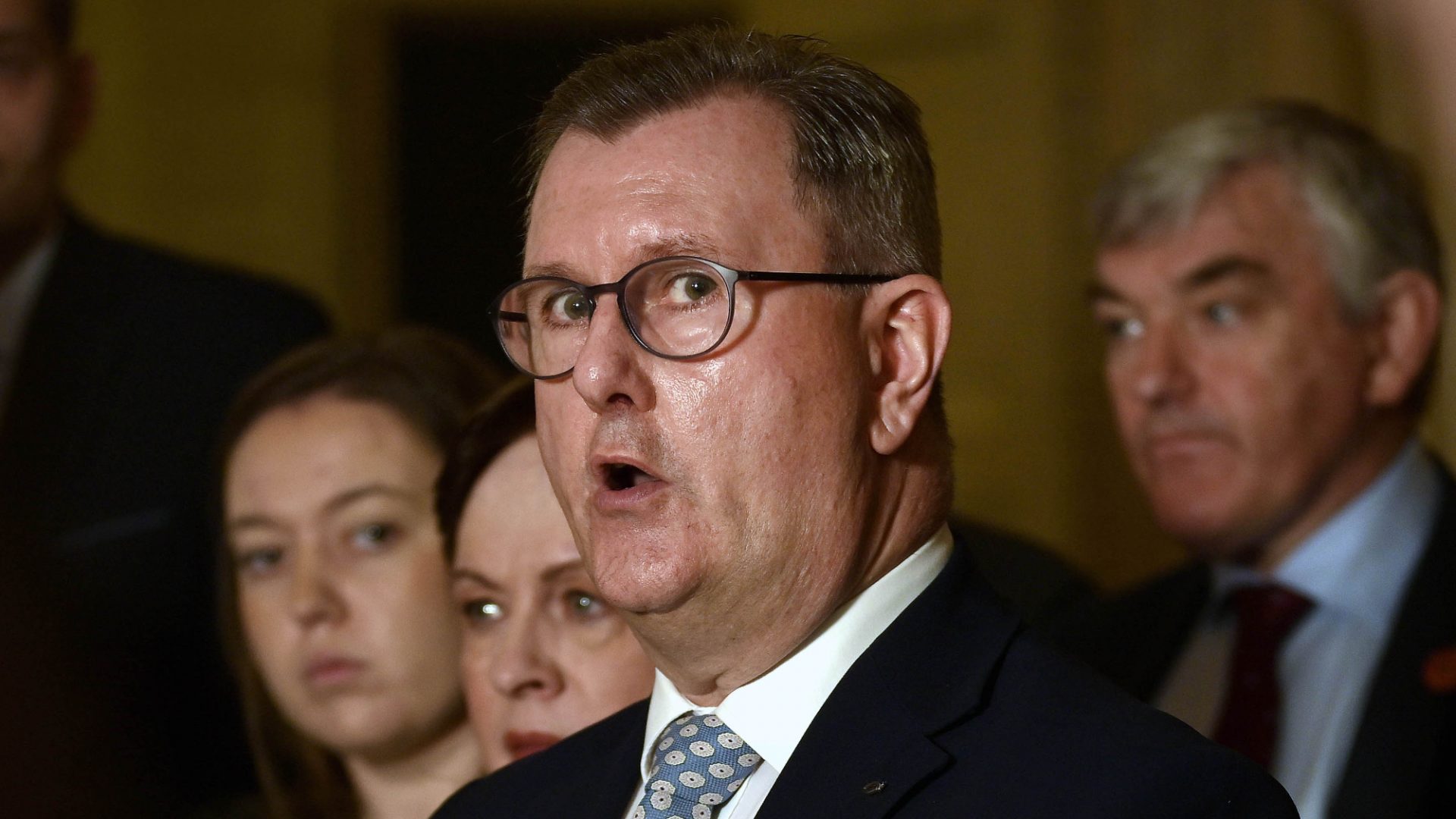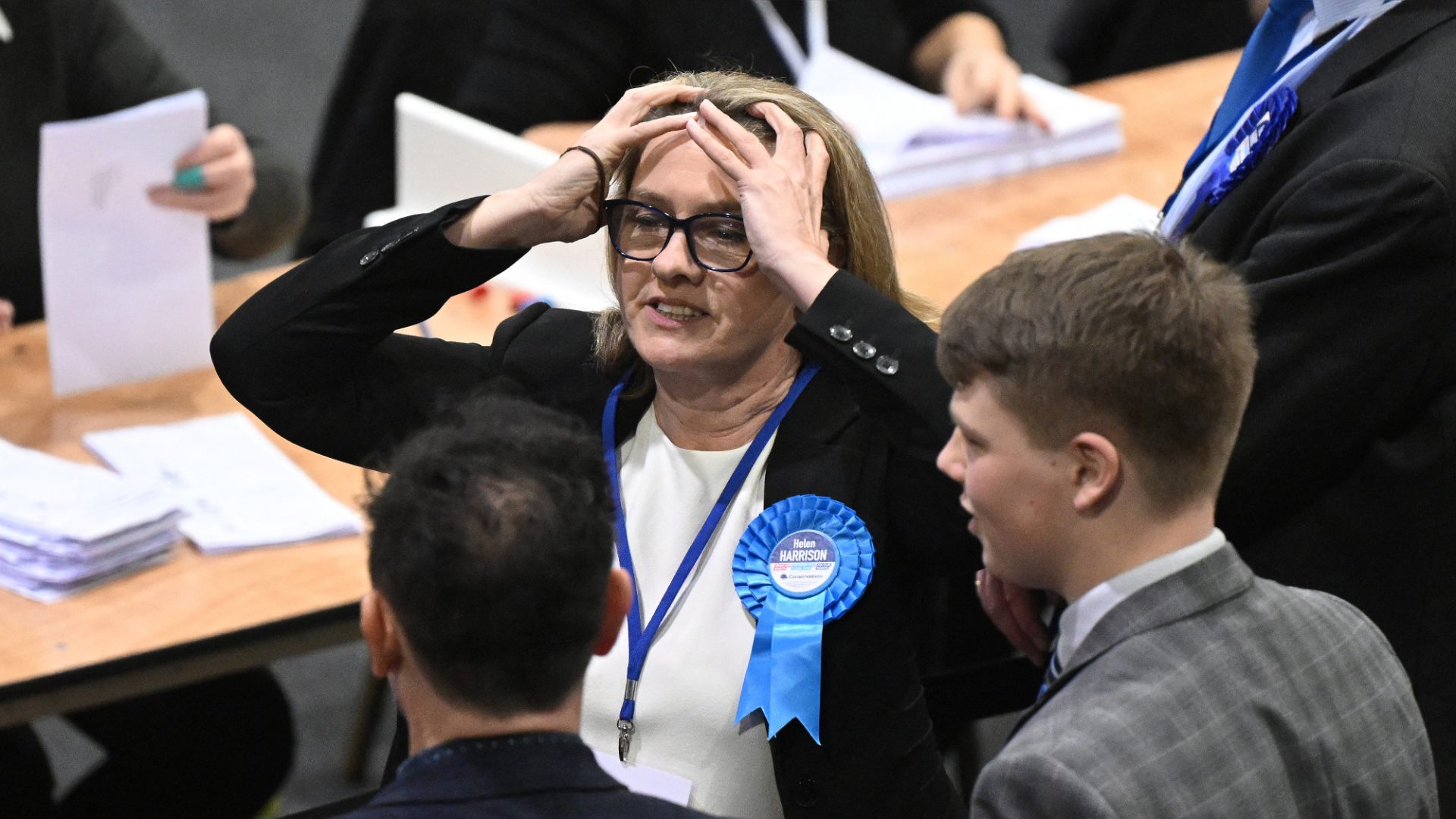On Wednesday, April 24, a man once feted by monarchs, prime ministers and presidents will make his next public appearance. Sir Jeffrey Donaldson will be at Newry Magistrates Court, County Down, when charges of sexual offences including rape will be formally put to him.
Shockwaves from the arrest of the Democratic Unionist Party’s leader and his wife Eleanor continue to reverberate across Northern Ireland society. Yet amid the drama, the disbelief and the disgust is a significant cause for relief. The power-sharing Stormont Executive – newly restored after the renegotiated Irish Sea border deal – is proving remarkably robust amid the crisis.
A political heavyweight who came to prominence during the Troubles, Donaldson’s downfall was unexpected and dramatic. The morning after he was pictured smiling at a religious service in Belfast, he was woken at his home in a dawn raid by detectives, arrested and driven to a police station for questioning.
Fourteen hours later, the 61-year-old was charged with multiple offences which include a single count of gross indecency and nine counts of indecent assault. Eleanor, 57, was charged with aiding and abetting additional offences in relation to the same investigation. Both deny the charges.
The story broke the next day – Good Friday, a date resonant with deep political irony for Donaldson. First, his social media accounts and website vanished, causing frenzied speculation.
At lunchtime came confirmation that he had resigned as party leader. Shortly after, the Orange Order – the conservative unionist and loyalist organisation – suspended his membership. Donaldson has also been suspended from his role as UK prime trade envoy to Egypt and Cameroon.
There were fears that a more important suspension might result too – that of Stormont, which only returned in January after a two-year boycott by Donaldson’s DUP, the largest unionist bloc, in protest over the Northern Ireland Protocol. But these have abated.
Hardline unionists, including Traditional Unionist Voice (TUV) party leader Jim Allister and loyalist Jamie Bryson, remain opposed to the Irish Sea border. They had already denounced the “Donaldson deal”, accusing its negotiator of overselling it after he abandoned his demand for an end to a trade barrier between Great Britain and Northern Ireland.
Critics argue that the deal is now tarnished by the allegations engulfing Donaldson, but it is unlikely they will be able to muster any significant support. The previous anti-Irish Sea border campaign, which saw night-time rallies in Orange halls and town centres across NI, ended in failure, and a recent poll found 67% of unionists backed Donaldson’s decision to sign the deal and return to Stormont.
Crucially, those in the DUP’s own ranks who opposed the deal have largely remained silent since the Assembly returned and are even less likely to break cover now. The spectre of losing further ground in the looming Westminster election is focusing minds.
A recent poll saw the DUP on 24%, seven points behind Sinn Féin (SF), the republican party which now has the largest mandate and holds the post of first minister. Further internal civil war risks heavy casualties on polling day. Senior DUP sources say that even those who disliked Donaldson are now focusing on maximising its vote share to stave off growing calls for an Irish unity referendum.
If the DUP has lurched from one crisis to another, it has at least picked up enough damage limitation skills to have handled this one well. With uncharacteristic speed, it immediately announced Gavin Robinson MP as interim leader.
Aged 39 and a former barrister, Robinson is among the DUP’s most liberal voices. Previously Donaldson’s deputy, he is a moderate committed to making devolution work.
But potential catastrophe lies ahead – Robinson holds his own East Belfast Westminster seat on a slim 1,819 majority. If he were to lose it, the DUP would struggle to find a new leader.
Donaldson was arguably the only senior DUP figure with the authority and trust to persuade sceptical unionists to give his deal a chance. His 40-year political career saw him walk out of the 1998 Good Friday Agreement peace talks on the final day over paramilitary prisoner releases without firm plans to decommission weapons.
Five years later, he quit the Ulster Unionist Party in protest at leader David Trimble’s continuing support for the GFA, and joined Ian Paisley’s DUP, a party renowned for hardline positions and religious campaigns.
Being associated with the Troubles – Donaldson served in the British Army’s Ulster Defence Regiment – can be a double-edged sword now in Northern Ireland, where many want to move on. Donaldson wanted to modernise the DUP, widening its outreach. Robinson is likely to double down on that.
Rival parties have been careful to avoid grandstanding and point-scoring over the Donaldson allegations. With two alleged victims at the heart of the story, that would not be a good look.
But it is also because the public for the most part welcomed Stormont back. They crave stability, desperate for improvements in huge health waiting lists, crumbling infrastructure and dire public services.
With commendable sangfroid, first minister Michelle O’Neill, SF’s vice president, stressed the need for cohesion and calm after Donaldson’s resignation. SF has its own need to demonstrate the value of the restored institutions with dissident republicans still vocal and sporadically active.
Moreover, with an election looming in the Republic, it is keen to show it is already in practice a governing party, disputing a recent estimate of the cost of unity to the Republic of potentially €20bn (£17.15bn) a year for 20 years.
That there is discernible optimism in Northern Ireland is a measure of the limited cross-community progress over the past 25 years. People have been heartened to see O’Neill standing for the British national anthem at a football match and the DUP deputy first minister Emma Little-Pengelly playing camogie – a predominantly nationalist sport – at a GAA (Gaelic Athletic Association) club.
The two women also went on a triumphant St Patrick’s Day visit to Washington, putting the case for NI plc to benefit from its dual access to the European Union and Great Britain.
It was the kind of photo op that Donaldson used to enjoy. Soon he will have the eyes of the world on him once again. But this will be a very different occasion.




